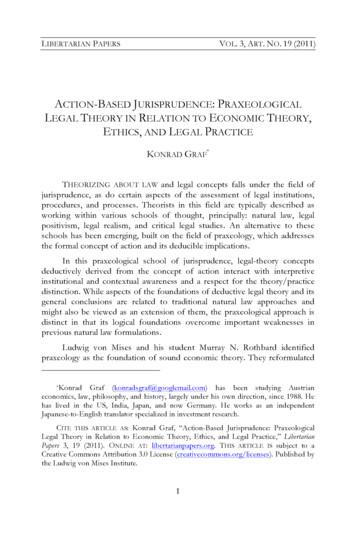Legal-Page 4
Nigerian Legal System in resolving disputes as and when necessary. To make an attempt to create national legal norms that regulates and stipulates rights and duties of the citizenry, etc. These broad aims will be achieved by: i. Introducing you to Nigerian Legal System, and the basic principles and sources of Nigerian Legal System. ii.
Legal Risk Management A heightened focus for the General Counsel On a narrow definition of legal risk, it is clear that the GC and the Legal function are accountable for identifying and managing those risks which arise from Legal's operations. In the three lines of defense model, a commonly used risk management
LIBERTARIAN PAPERS VOL. 3, ART.NO. 19 (2011) 1 ACTION-BASED JURISPRUDENCE: PRAXEOLOGICAL LEGAL THEORY IN RELATION TO ECONOMIC THEORY, ETHICS, AND LEGAL PRACTICE KONRAD GRAF* THEORIZING ABOUT LAW and legal concepts falls under the field of jurisprudence, as do certain aspects of the assessment of legal institutions, procedures, and processes. Theorists in this field are typically des
The Legal Process School dominated the elite legal academy during the decade running roughly between 1953 and 1963, and it was the last juris-prudential approach to enjoy something like general hegemony in legal scholarship. 3 The end of the Legal Process consensus thus ushered in the great Balkanization of American jurisprudence.
The 'rights of nature' movement is a more recent development in Western legal thought than the concept of legal personality. In 1972, Professor Christopher Stone proposed that the American legal system "give legal rights to forests, oceans, rivers, and other so-called 'natural objects' in the environment - indeed, to
legal advice and support across the core legal disciplines. Every operation is different, and each one requires its own unique legal support. As such, commanders and judge advocates will have to work together to task-organize legal support for operations in a way that makes sense and helps accomplish the mission.
Legal research is the process of identifying and retrieving information necessary to support legal decision-making. Finding and using legal resources can be challenging. While there is no one "right way" to conduct legal research, this document outlines guiding principles you may find useful as you begin your research.
giving legal advice. Legal advice is a written or oral statement that: Inter p rets some as ect of th elaw, courtles, or du s; Recomme nd s a pecific c ourse of ndu ters h ld k ein an actual or ntial legal proceeding; or 'sApplies th elaw to individu alperso n seci fic actu circums a . What is Legal Information?
LEGAL CAPACITY In most cases, if a person living with dementia is able to understand the meaning and importance of a given legal document, he or she likely has the legal capacity (the ability to understand the consequences of his or her actions) to execute (to carry out by signing it). As long as the person has legal capacity, he or
o Updates The Judge Advocate General's provision of legal support to the Army's current force structure, to include direct support to brigade and brigade equivalent elements (para 3-6. d). o Provides policy and guidance on the Consolidated Legal Office for delivery of legal services at installations that have
Material in this Guide should never be taken as providing you or any other person with legal advice. Legal advice regarding the application of the law to a particular circumstance or situation can only come from a legal practitioner. A range of sources for legal advice can be found in the Guide.
Seminar on current legal topics can be analogized with comparative law in the sense that it is a method of legal education rather than an area of law in itself. It is one among the different methods of legal education like legal internship, externship, class lecturing, or clinical training. Seminar, as a method of course











